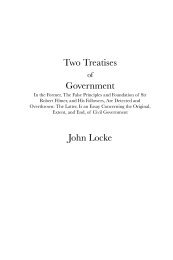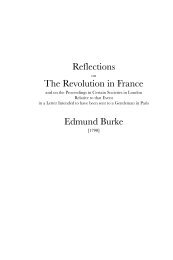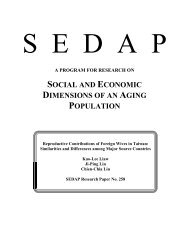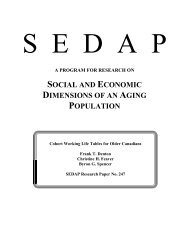Das Geheimnis des Opfers oder Der Mensch ist, was er iÃt The ...
Das Geheimnis des Opfers oder Der Mensch ist, was er iÃt The ...
Das Geheimnis des Opfers oder Der Mensch ist, was er iÃt The ...
You also want an ePaper? Increase the reach of your titles
YUMPU automatically turns print PDFs into web optimized ePapers that Google loves.
friendship, fidelity, and of an alliance,” but not only because it protects the mat<strong>er</strong>ial<br />
which is in contact with it from decay and decomposition, but because salt is the symbol<br />
of food. It is the symbol of food because it gives food its soul, taste and digestibility,<br />
leaving out of consid<strong>er</strong>ation the fact that salt itself is a comestible — since th<strong>er</strong>e wh<strong>er</strong>e it<br />
is used for itself alone, wheth<strong>er</strong> in life or in language — for example, in the saying:<br />
“many bushels of salt we’ve eaten togeth<strong>er</strong>,” according to a well-known figure of thought<br />
and of speech — it is used only pars pro toto i.e., wh<strong>er</strong>e it stands for food, a community<br />
of food. But this eith<strong>er</strong> presupposes or results in a community based on sentiment, a<br />
natural community. Thus, in the Oriental, even in the Hebraic tradition according to Ezra<br />
— incidentally in one of the ambiguous passages — to eat salt means the same as in<br />
G<strong>er</strong>man, to eat bread, which, admittedly, inclu<strong>des</strong> both “to be a s<strong>er</strong>vant,” and “to sing a<br />
song.” Thus the Arabs to this day eat bread with salt when they conclude a pact, and the<br />
Greeks add the table at the same time to their expressions wh<strong>er</strong>e salt is the symbol of<br />
friendship, in particular, of hospitality, the most sacred friendship — <br />
[(some) salt and (a) table]. <strong>The</strong> Romans, howev<strong>er</strong>, put onto the table sacred to the Penates<br />
a plate full of first fruits in addition to the salt-cellar, in ord<strong>er</strong> to remind us, apparently,<br />
that the table goes with salt, food goes with the table and we ought thus not to forget the<br />
common use and employment of salt beyond the symbolism, the sale nihil utilius.<br />
(Nothing is more useful than salt.) How truly important it is not to deny in thinking even<br />
about divine matt<strong>er</strong>s themselves the above quoted Hom<strong>er</strong>ic prov<strong>er</strong>b conc<strong>er</strong>ning man, not<br />
to forget in thinking the connection of the head with the stomach, the n<strong>er</strong>ves with the<br />
blood, the soul with the body! We see in our symbol<strong>ist</strong>s the p<strong>er</strong>nicious consequences of<br />
forgetting this, when they see in the salt-cellar on the altar, the “table of God” or of the<br />
Lord, but ov<strong>er</strong>look the plate full of food standing directly next to it.<br />
Surely the Hebraic “covenant of salt” too — an expression appearing twice in the<br />
Old Testament — or, as it is inv<strong>er</strong>sely stated in one passage: “the salt of God’s<br />
covenant,” signifies nothing more than the sacrificial or food covenant between Jehovah<br />
and his people. In his dictionary Gesenius himself approves of the d<strong>er</strong>ivation of the<br />
Hebrew brit, i.e., covenant, from barah, i.e., food, because in the orient “to eat with<br />
someone” is tantamount to making friends with them, and the Hebrews, on concluding a<br />
covenant, feasted, as the first book of Moses proves. Since the salt covenant is an<br />
“et<strong>er</strong>nal” one, it <strong>was</strong> thus concluded that salt is h<strong>er</strong>e a symbol of durability and constancy<br />
on account of its cons<strong>er</strong>ving, pres<strong>er</strong>ving prop<strong>er</strong>ty against dissolution. But even if salt








